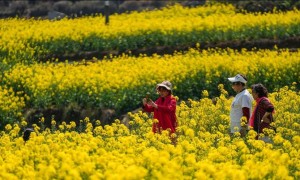Whether we expand existing towns or build new cities it begs the question about how we build an environment that helps us live in harmony with each other and with the natural world, upon which we depend for our existence.The history of the earth told by the Bible has us beginning our journey in a garden and finding our destiny in a garden city.The last chapter has a vision of "the river of the water of life, bright as a crystal, flowing through the middle of the city". And on either side stands the Tree of Life with leaves for the healing of the people. It's a picture of harmony between the built and natural environments.Not so long ago I invited some of Liverpool's Leaders to meet an international expert on sustainable cities. Professor Herbert Giradet set out ten key principles on how to make cities liveable and sustainable.Up until that point I'd always seen cities in a linear way - gobbling up resources at one end and spitting them out at the other. The seminar helped me to see how waste could become energy. Cities could be circular, not linear, and mimic nature itself.

无论我们新建还是扩建城镇,我们总会问,该建成一个什么样的环境才能让人和人之间和睦相处,和自然之间和谐共存,因为这些都是我们生存的基本条件。《圣经》中的人类历史:我们人类在一座花园(伊甸园)中诞生,并在一座花园城市中寻找自己的宿命。最后一章这样描述道:“生命之河,如水银泻地,在城市中流淌。” 河两岸是生命之树,它的树叶能为人们去病消灾。这就是一副自然与人工环境和谐共存的画面。不久之前,我邀请了利物浦的一些领导会见了一位城市可持续发展方面的专家。Herbert Giradet教授针对城市人居和可持续发展方面给出了10点关键原则。在此之前,我一直以为城市是单向的,一头吞噬大量资源,另一头将之消耗排出垃圾。这次研讨会让我认识到,废物也能变成能源。城市也可以像自然界一样循环再生,而非一直单向。







